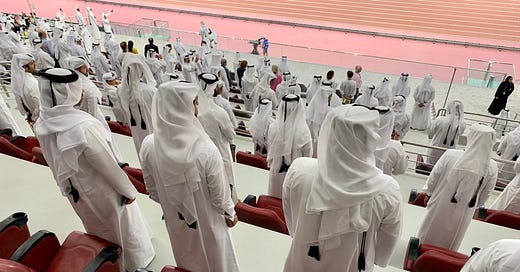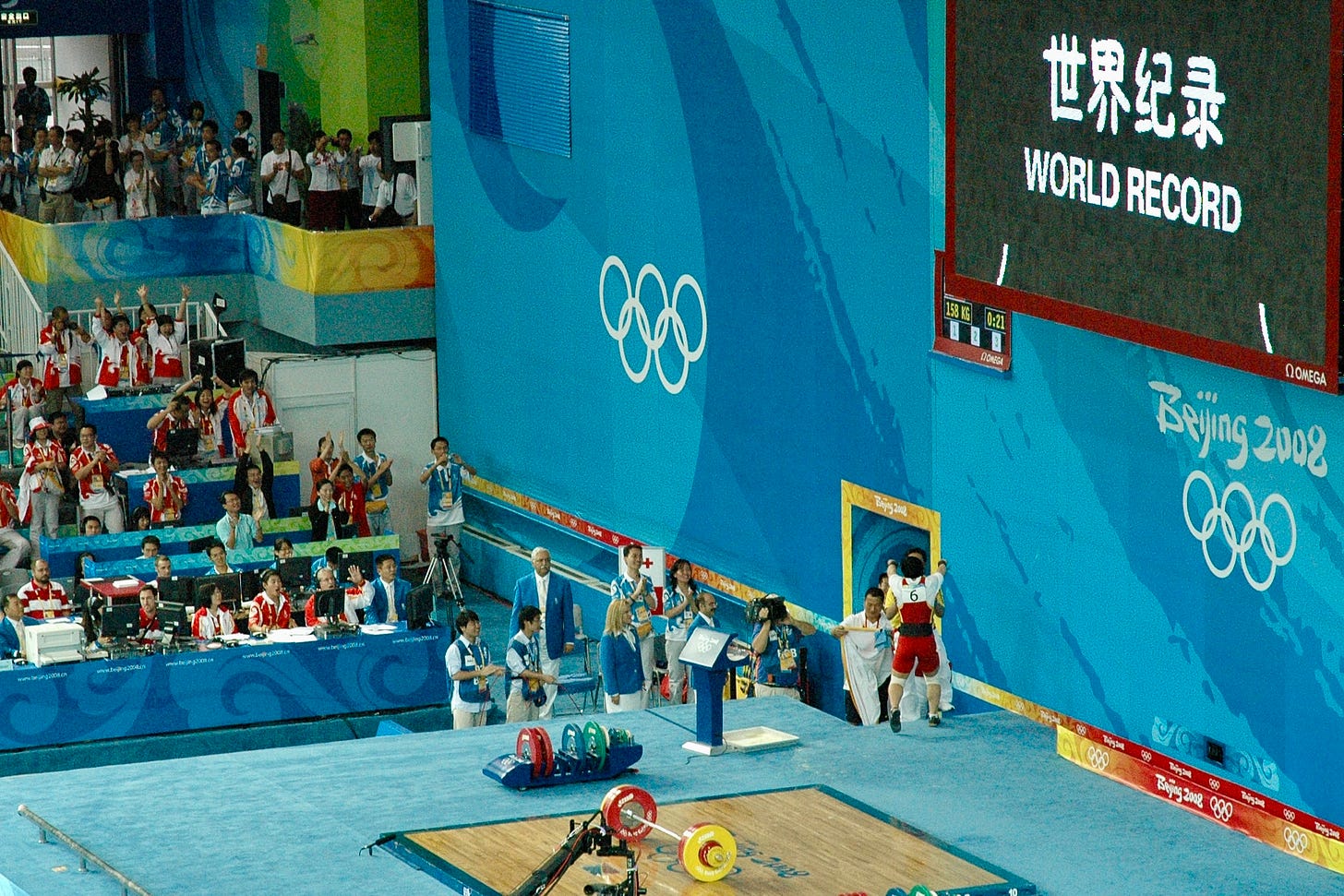A city without snow and a state in the desert. Obvious places really to hold the Winter Olympics and football World Cup if you are the IOC and FIFA. Welcome to 2022, the Year of the Sportswash.
The principal outdoor venues for Beijing 2022 are - on a good day - ninety minutes and two and a half hours’ drive respectively from the Forbidden City. The alpine skiing in Zhangshanying will rely almost entirely on artificial snow. But the IOC has no truck with those who believe winter sports should be held where snowfall is plentiful. After all, its 2014 Games were held in the subtropical seaside resort of Sochi.
Qatar has a population of 2.9 million, only a little over 300,000 of them native Qataris. Just as the Chinese have constructed snow resorts to welcome the world, so Qatar has built six stadiums for the World Cup and refurbished two others. Just one is fully demountable, although others will be trimmed in size to leave the tiny desert state - whose national team has never played in a World Cup - with seven world class venues ranging in capacity from 20,000 to 40,000.
The snow in Beijing will look fantastic, as will the pitches in Qatar. Doubtless the quality of the sport will match the surroundings, although the November schedule for the football raises important questions about player welfare, as well as the knock-on effect on national club competitions halted for a swift run at the most important tournament in the game.
The prospect of compelling sport shouldn’t though silence the key questions: why Beijing, and why Qatar? It is easy to blame the IOC and FIFA hierarchies who steered the bidding processes, but their national members ultimately voted for the two hosts.
What does China need of a Winter Games? Certainly not international kudos, nor the rumblings of discontent about human rights and diplomatic boycotts of the event. Most likely, its leaders are of the ‘bread and circuses’ persuasion, banking on creating goodwill among a huge population largely oblivious to noises off. The IOC, it seems, needs China - an unreliable but potentially hugely lucrative source of commercial revenue.
It’s much harder to see what FIFA gets from Qatar. Allegations of corruption in the bidding process in 2011 have nipped at the heels of Qatar 2022 ever since. Certainly, FIFA has no need of this venue in its ambitions for global sporting domination. And it’s taking a big risk around a late autumn timing and attendances.
I led London’s bid to host the 2017 World Athletics Champs against competition from Doha, Qatar back in 2011, just after the state’s World Cup bid success. It was tough and at times unpleasant, with unsubstantiated rumours of brown envelopes changing hands on the eve of the vote. My business lesson: never underestimate your opponent in a contest in which coming second is as good as coming last.
At the Beijing 2015 World Athletics Championships, I watched from my hotel window coaches filling a massive parking lot each morning with Chinese bussed into the Birds Nest Stadium. I’ve no way of knowing whether they’d paid - or been paid - to attend the athletics. No doubt the Beijing 2022 organising committee has all their names and addresses should they be needed next month.
Four years later I sat in a sparsely populated Al Khalifa Stadium for the Doha 2019 WAC. The venue only filled on the night that local hero Mutaz Barshim won the high jump - and even then it created the uncomfortable sight of a crowd almost devoid of local women and girls.
Athletics, though, isn’t football (of which more below), so there has to be a fair chance that overseas fans and seat-filling with non-Qatari local workers will create a solid enough backdrop of people for the global TV audience.
The simplest question to answer is what Qatar gets from hosting the FIFA World Cup. An exit at the group stages for the home team no doubt, but four weeks of glittering imagery worldwide to wash over concerns about the immigrant lives that the state has been built on.
Bolt. Stable door
A year later than scheduled, the World Athletics Championships rocks up to Eugene, Oregon this summer, its first outing since Doha 2019. A guide to 2022’s major sporting events in one national newspaper this weekend chose not to feature either the WAC or the Birmingham Commonwealth Games as its summer highlights, flagging the Tour de France and the Women’s Open Golf instead. Such is the state of track & field right now.
And yet both events should be stellar sporting occasions. The WAC will be superbly organised - not least because of the leadership of my former colleague Niels de Vos - in front of a packed, knowledgeable crowd in the hometown of Nike. The sportswear giant is not a sponsor of World Athletics, but just watch its super shoes break records, so creating the ultimate in ambush marketing.
World Athletics has seen records on the track and roads tumble over the past couple of years as new shoe technology has helped athletes slice chunks off previous marks. The governing body has chosen not to follow swimming which allowed revolutionary swimsuits for less than two years of shattered records before banning them from competition.
Instead, WA has chosen to limit the scale of technological innovation rather than outlaw it. Just before Christmas it announced a new limit on the thickness of shoe soles for middle- and long-distance track events which won’t take effect until November 2024, so as to give manufacturers such as Nike time to adjust. This then gives shoe companies three summers in which to milk the current regulations.
"When somebody does a great performance now, everybody will question if it's the shoe, and that is the credibility problem." Karsten Warholm after breaking the 400m hurdles world record at the Tokyo Olympics
Last weekend Ethiopian athletes running in Nike shoes broke both the men’s and women’s 5k road race world records - the latter by a whopping 24 seconds for a mixed gender race.
Expect much more of this. But the world barely noticed. What, though, if Nike could help propel a male athlete to 9.57 seconds over 100m in Oregon this summer, so breaking Usain Bolt’s 13 year-old world record? Or a woman to 10.48 seconds to finally eclipse Flo-Jo’s time from a very different era?
Usain Bolt. Remember him? Seems athletics has failed to capitalise on his aura as he’s slipped from view. Note he is/was a Puma athlete, so his records are a prime target for Nike
Whatever your view of super shoes, athletics needs the controversy they are stirring, but not as much as it needs the world records they could facilitate - so long as they are the right records and at the right time. Oregon22 starts on 15 July.
Weight a minute
Great interview by Matt Dickinson with Emily Campbell, Britain’s first female weightlifting Olympic medallist, here: Emily Campbell or below:
(And in case you’re wondering having read the piece, British Weightlifting does have some lottery funding for Paris, although not - frustratingly - as yet in the major tier of supported sports. Campbell has secured personal athlete funding)
It’s often advisable to avoid the comments below such articles. In this instance there’s a smattering of ‘why should we fund people’s hobbies?’ stuff. Which did get me thinking again about the pros and cons of lottery funding - especially pertinent in this tenth anniversary year of London 2012.
I’ll return to this subject in future editions of Sport inc. For now though, I’d just like to recommend anyone planning a trip to Paris 2024 to bag a weightlifting ticket. Not only because the sport’s woeful global leadership may mean it is chopped from future Games, but because in the flesh this is competition at its most visceral and intense.
A visit to the Beihang University Gymnasium to see Liu Chunhong win women’s 69kg gold for China with a world record was a highlight of my Beijing 2008 Olympics.
Wrapped in the scarf
Brave of opposition leader Keir Starmer to align himself with football in his latest appeal to the electorate.
“For me a football stadium will always be the heart of any community” Keir Starmer
The nation’s favourite sport has previously dented the street cred of both Tony Blair (reported - years later shown erroneously - to have claimed he saw Jackie Milburn in action although the player had retired with Blair aged four and living in Australia) and David Cameron (who confused ‘his’ team in a speech with another that plays in the same colours - Aston Villa and West Ham). Starmer is a Gooner, BTW.
Sarnies at the ready
If you’re at a loose end at 2pm on 18th January, do join me virtually to discuss building a career in sports governance at iSportLearn’s Lunchtime Learning event.
Here’s the registration link: Lunchtime Learning







Couldn't agree more re weightlifting Ed. I took my 12 year-old daughter Anna to the men's mosquito final in London and it was epic. 5,000 sports-loving Brits (mostly) packed into a box at the Excel willing all the competitors on. Indelible memory.